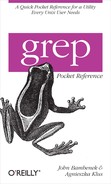0%
6Chapters
0-1Hours read
0kTotal Words
Book Description
grep Pocket Reference is the first guide devoted to grep, the powerful Unix content-location utility. This handy book is ideal for system administrators, security professionals, developers, and others who want to learn more about grep and take new approaches with it -- for everything from mail filtering and system log management to malware analysis. With grep Pocket Reference, you will:
- Learn methods for filtering large files for specific content
- Acquire information not included in the current grep documentation
- Get several tricks for using variants such as egrep
- Keep key information about grep right at your fingertips
Find the answers you need about grep quickly and easily. If you're familiar with this utility, grep Pocket Reference will help you refresh your basic knowledge, understand rare situations, and work more efficiently. If you're new to grep, this book is the best way to get started.
Table of Contents
- 1. grep Pocket Reference
- Introduction
- Conceptual Overview
- Introduction to Regular Expressions
- grep Basics
- Basic Regular Expressions (grep or grep -G)
- Extended Regular Expressions (egrep or grep -E)
- Fixed Strings (fgrep or grep -F)
- Perl-Style Regular Expressions (grep -P)
- Introduction to grep-Relevant Environment Variables
- Choosing Between grep Types and Performance Considerations
- Advanced Tips and Tricks with grep
- References
- Index
- About the Authors
- Copyright
